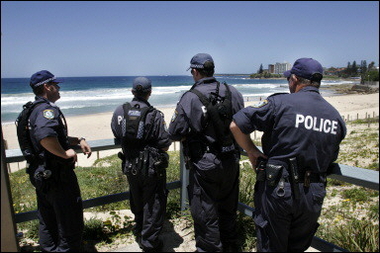 Neil McMahon, The harassment by other Australians is relentless, young Lebanese people say – on trains, at school, on the street, at the beach. But no authority figures attract as much criticism as police officers.Rania Hamam, 18, who was interviewed for the research project by the Centre for Peace and Conflict Studies, told the Herald that police harassment was common.She had been stopped and ordered to surrender her mobile phone in Auburn on Wednesday. "I said to him, ‘My phone is private’, but he took it anyway," she said. The officer checked the phone for text messages as part of the police crackdown after recent racial clashes.Ms Hamam said she wanted to become a police officer – because the only way she could see the force changing was if people of different backgrounds joined it. "If police treat us with respect we will reply with respect," she said. The centre’s research on racism revealed a widespread perception of police bias.
Neil McMahon, The harassment by other Australians is relentless, young Lebanese people say – on trains, at school, on the street, at the beach. But no authority figures attract as much criticism as police officers.Rania Hamam, 18, who was interviewed for the research project by the Centre for Peace and Conflict Studies, told the Herald that police harassment was common.She had been stopped and ordered to surrender her mobile phone in Auburn on Wednesday. "I said to him, ‘My phone is private’, but he took it anyway," she said. The officer checked the phone for text messages as part of the police crackdown after recent racial clashes.Ms Hamam said she wanted to become a police officer – because the only way she could see the force changing was if people of different backgrounds joined it. "If police treat us with respect we will reply with respect," she said. The centre’s research on racism revealed a widespread perception of police bias.
One man, Tariq, 19, recalled driving around Auburn and Bankstown with a friend who owned a Mercedes. In one night, he said, they were pulled over 22 times. Tariq said his friend had asked police why he was being harassed. An officer had replied: "A young, ethnic guy driving a Mercedes – why wouldn’t we?" Another, more disturbing, incident was described by Hana, a 16-year-old girl, who said a police officer asked a male friend: "Which girls are you ready to rape?"Ms Hamam said some members of the Lebanese community had to take responsibility for contributing to the problem.
There was "blame on both sides", but governments, police and the media had to contribute to the solutions.



